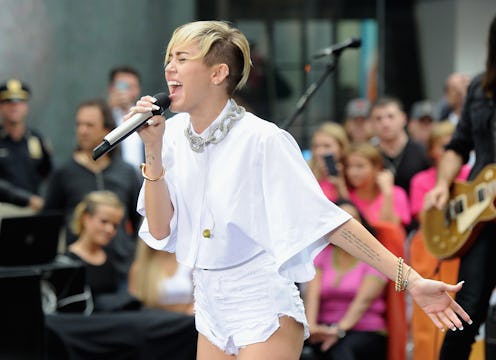Entertainment
Do We Hate on Miley Because Of Her Past?
Whether you love her or hate her or just want her to go away, there's no denying that Miley Cyrus has become a majorly controversial figure. In recent months, everything she'd done — releasing Bangerz , twerking on Robin Thicke, hosting Saturday Night Live — has been analyzed to death. Some people (Bustle included) argue that Cyrus is simply playing with her image and is keenly aware of the effects her actions have on her portrayal in the media. Others believe that the 20-year-old is spinning wildly out of control, and it won't be long before she winds up in rehab.
There's no problem with criticizing Cyrus; she's a public figure, and her actions aren't guaranteed to please everyone. It's fine to judge her clothing choices, her song lyrics, or her love affair with urban culture. But to accuse her of being on the fast track to rehab? That's just unfair, and it says more about our culture than it does about Cyrus.
As the media-consuming public, we don't have any problem with Cyrus' actions themselves. All of the things she's done — perform dirty dances, wear revealing clothing, create NSFW music videos — are all things we long ago admitted we love. Stars like Madonna, Lady Gaga, and more have capitalized on our obsessions with anything risqué, and have made careers out of shocking audiences through their art and interviews. Another prime example? Rihanna, who has become one of the most successful recording artists today by cultivating an R-rated, "bad girl" image. She sings about S&M, changes up her look every few weeks, and has an Instagram full of weed-smoking photos, and yet we don't assume she's having a mental breakdown. That's just her image, we argue. That's just who she is. It's the same for Gaga. Wearing a meat dress and screaming naked in a field? Weird, sure, but it's art, not insanity. Madonna, kissing girls at the VMAs, offending religious leaders everywhere, and cursing on David Letterman? She may be wild, but she knows what she's doing. Yet when Cyrus sings about taking drugs and having sex, it's indicative of a serious mental issue. She's bound to end up in rehab, we say, because it's obvious that she's out of control.
This is a hugely unfair accusation, and the reason it exists is simple: Cyrus, unlike Madonna, Gaga, or Rihanna, was a child star. We knew her before the twerking and the wrecking ball, back when she was a country-singing Hannah Montana star who swore she'd never heard a Jay-Z song in her life. Because of this, we find it hard to believe that the Cyrus of 2013 is real. How can someone change so drastically in such a short amount of time? It can't be possible, we say, and so we make up excuses for her behavior — she's "troubled," or "drugged out." Soon enough, she'll land in rehab, because that's the obvious end to her downward spiral from beloved child star to controversial singer.
Yet Cyrus is far from the only star to change up her image. Gaga and Rihanna may not have been TV stars as children, but they were people before they became famous. Take a look at old photos of Gaga, who, as Stefani Germanotta, was a soft-spoken piano player with a Catholic school upbringing. All of the things we ascribe to Gaga now, like questionable clothing choices and provocative music videos, only began once Gaga had made it as a singer. Rihanna's now known for stirring up debate every time she opens her mouth, but up until a few years ago, the most controversial thing about her was her haircut. And Katy Perry, before she donned whipped cream-shooting bras, was a Christian artist. These women made purposeful decisions to change their images either to or upon reaching fame, and as consumers, we never questioned them, because their post-debut personas were all that we knew.
For Cyrus, though, it's different. She grew up in the media, and we know how different old Miley was compared to the Miley of 2013. It's hard for us to distinguish between the two, because we saw both; Cyrus and Rihanna may have made similar image transformations, but because Cyrus' was public and RIhanna's was not, we find them completely different. But it's cruel for us to judge the "Wrecking Ball" singer just because of her background. By refusing to let go of Cyrus' old image, we're letting her take the blame for our shortcomings.
It's understandable that we have trouble getting rid of our image of Cyrus as an innocent pre-teen on Hannah Montana, an enormously popular show that propelled a young Cyrus into stardom. But to be so against her transformation into adulthood that we call her crazy and accuse her of mental illness, when so many of her peers have made the same changes without our criticism? It's hypocritical and damning. You don't have to like Cyrus' new image, but you do have to understand it. Yes, she's a former child star, but she's also an artist who's allowed to mature. Give her the same respect you gave Gaga or Rihanna when they first began to shake things up; we didn't predict that they'd end up in rehab, so why are we saying that Cyrus will?
